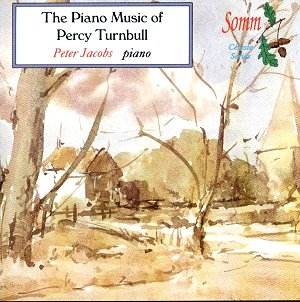Percy Turnbull was born in Newcastle in 1902 and trained as a chorister and pianist. He left school at fourteen, had a career cut across by the First World War but managed to become a Foundation scholar at the RCM in 1922 where he studied with Holst, Vaughan-Williams and John Ireland (he’d earlier moved in W.G. Whittaker’s circle). He spent much of the next couple of decades scraping a precarious living, as radio accompanist on 2LO (precursor of the BBC), theatre musician, piano roll editor and doing a vast amount of copying work for OUP – the list of works which he edited is a roll call of significant British music of the time. He made the first copies of Vaughan Williams’ Fourth Symphony and Job and Walton’s Viola Concerto, for instance. After the second war, in which he served on an anti-aircraft battery, he had a degree of stability as piano teacher at Surrey College, managing to keep up his old friendship with erstwhile teacher, John Ireland.
Turnbull’s music was inevitably informed by a number of influences. Though he was greatly taken by Rachmaninov and by Medtner he was also an avowed enthusiast of Delius but greater even than these were his Francophile sympathies, which are predominant in this attractive disc. Turnbull had a talent for the witty and vivacious miniature and an ability to paint in glinting and sometimes wistful colour. The Seven Character Sketches, of which Peter Jacobs gives us four, are characterful and brief; the third in the set pays oblique tribute to John Ireland, the Seventh is a sturdily martial affair. Of the three recorded miniatures (of seven) Sonnet has traces of Rachmaninov but is simplified, chordally at least and has a nourishingly elliptical air about it, whilst Rondoletto, as its name might suggest, is bright and breezy. There are some rather beautiful modulations in Pastoral, a splendidly conceived and sustained five-minute piece. His Pasticcio (on a theme of Mozart) naughtily pays homage to named composers. His Brahms and Schubert especially hit the mark. Pert harmonies keep alive the lyricism embedded in the Sonatina with its driving and quick-witted last movement.
The Dances are full of vivacity and feeling; the Valse is particularly impressive in the way it constantly thwarts expectation and seems to blur from its assumed trajectory at every twist and turn. The Minuet is thoughtful and pensive. Turnbull could always turn his hand to Ravelian voicings and was adept at colour and at sound effects – Carolondo, the first of his Winter Pieces has infectious little baroque voicings and delightful bell peals – composed around 1956 these were Turnbull’s adieu to completed works for piano.
Jacobs has just the right weight for Turnbull’s pictorial and disarming miniatures. Time and again he brings out the delicacy, the shade and the puckish wit inherent in them. Notes, by Jeremy Dibble, are up to his accustomed standard. A delightful disc.
Jonathan Woolf
